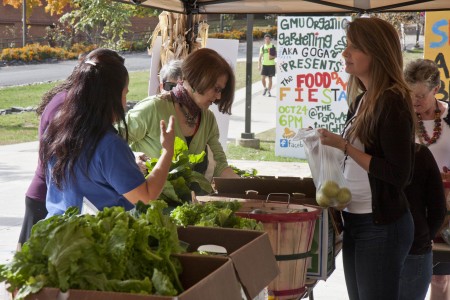Sophomore Kelly Pizzingrilli purchases two apples, two sweet potatoes and apple cider. She is not in a frigid grocery store and her food is not coming from halfway around the world.
“I like buying a lot of fresh stuff,” Pizzingrilli said. “I don’t like having preservatives or anything in my food.”
Globally, produce has acquired an international identity. Mason Dining, however, has decided to bring food back to local roots.
Mason Dining is creating locovores: consumers who choose local products, which creates health eating habits.
“If it’s fresher, it’s better. And helping out the local communities is always better than getting it shipped cross country,” said freshman Kevin Mason, who purchased apple cider produced in Frederick, Md.
Pizzingrilli got her fresh produce from Mason Dining’s Southside Farmer’s Market hosted on Oct. 24, National Food Day. This event was held for the second time this semester to give students access to local produce.
“The purpose of this event is to focus on local growers. We buy from a lot of different growers within a 150 mile radius,” said Mary Barron, Customer Relations Manager for Keany Produce.
The use of local food is also integrated into Mason Dining’s facilities on campus. Since the construction of Southside in 2008, Mason Dining has been drawn to using local products.
About 98 percent of mushrooms used on campus are from Pennsylvania. Tofu is purchased from Springfield, Va. A majority of the dairy products come from Harrisburg, Pa.
“There are a few items that no matter where you are on campus, they’re local,” said Benjamin McElhaney, Sustainability Coordinator for Mason Dining.
To allow for even more localizing of food consumption, McElhaney is planning a program to introduce seasonal menus.
“This time of year, squashes are local, but we don’t use that many on campus,” McElhaney said. “It’s just a matter of changing what we offer.”
Mason Dining has partnered with distributor Keany Produce to purchase fresh produce from reliable farms in Chestertown, Md., Batesville, Va., Vineland, Nj. and Waynesboro, Pa. The Farmer’s Market was run by Keany Produce and featured the same produce used at Mason Dining’s facilities on campus.
“We have local products available all year round,” Barron said. “A lot of people aren’t aware that in the fall, you can still buy local produce. We have collard greens that are available in North Carolina and New Jersey through December.”
The Farmer’s Market is the second of the semester but is not yet a regularly scheduled event. Mason Dining is willing to make a commitment to a weekly market if the demand for it is high enough.
“[At the first event], there were a lot of students asking, ‘Hey, going to be here next week?’ Unfortunately, [the answer is] no. But I told them if you want us to be here more often, bring your friends down,” McElhaney said.
Barron notes that a large number of commuter students were drawn to the Farmer’s Market on Oct. 24.
“It seems to be a lot of commuter students that like to cook and so they’ll buy things that a lot of students wouldn’t attempt to cook,” Barron said.
For some students, such as freshman Fiona Davies, local produce just provides a better quality of taste.
“I don’t really like red delicious apples, and that’s all they have in shopping centers,” Davies said. “I like the quality of these better.”
Not only does purchasing local keep the food local, it also helps support local businesses and farms.
“In the long run, it’s better because it keeps money in the same economic environment we thrive, or try to thrive in,” McElhaney said. “It also gives people a certain sense of pride. They say, oh I know that farm. I drive past it every day.”
To increase this feeling of community, Mason Dining has been working on creating a map so that students can pinpoint the farms that provide this food.
“It [being locally made] makes you want to buy it more because you’re helping out the community and you know it’s fresh,” Kevin Mason said.
Mason Dining is run by Sodexo, a food facilities and management company, which controls what food is being used and produced in dining places such as SubConnection, the HotSpot and Southside. The facilities not under Sodexo, such as Starbucks, Taco Bell and Chick-fil-a, do not fall under Mason Dining’s local produce initiative.
“Sodexo owns SubConnection,” McElhaney said. “So we can sub out that lettuce we use, we can sub out what tomatoes we use, cucumbers, whatever. We can change them around to what we see as necessary. If there’s an opportunity to sub out a local item, we will.”
McElhaney notes that some opinions have been brought to him not against the presence of local produce but rather pressure to decrease the 250 mile radius.
“Because of where we live, there’s only certain products that are available that are a guaranteed source,” McElhaney said. “We feed 33,000 people on this campus. That’s a lot of food. We need to have vendors that can give that to us and not just every joe farmer ten miles away can give us a quality product.”
For the 2012 fiscal year, $82,000 more was allocated from Mason Dining to purchasing locally.
“We’re hoping that from now until [the end of the fiscal year in June] we’ll be able to spend $100,000 more on local produce, local dairy products and local meats if they’re available,” McElhaney said.







Comments